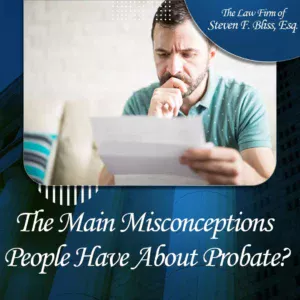In California, probate is often misunderstood, leading many families to make costly mistakes when planning estates. Probate is the court-supervised process of administering a deceased person’s estate, which includes validating a will, paying debts, and distributing assets. While this process serves a legal purpose, misconceptions about probate frequently create confusion, fear, and poor planning. Understanding the truth behind these misconceptions is essential for avoiding unnecessary complications.
 One common misconception is that having a will avoids probate. In California, a will must still be admitted to probate for the court to validate it and oversee the estate’s administration. The only way to bypass probate is to use other planning tools, such as a revocable living trust, joint ownership with right of survivorship, or beneficiary designations. A will directs how property is distributed, but it does not eliminate the probate process itself.
One common misconception is that having a will avoids probate. In California, a will must still be admitted to probate for the court to validate it and oversee the estate’s administration. The only way to bypass probate is to use other planning tools, such as a revocable living trust, joint ownership with right of survivorship, or beneficiary designations. A will directs how property is distributed, but it does not eliminate the probate process itself.
Another widespread misunderstanding is that probate is always quick and inexpensive. In reality, California probate often takes nine months to two years, depending on the estate’s complexity, court backlogs, and potential disputes. Costs can also be high, since statutory attorney and executor fees are based on the gross value of the estate, not the net. Families are frequently surprised to learn that debts and mortgages are not deducted when calculating probate fees.
A third misconception is that probate ensures privacy. Probate records in California are public documents, which means anyone can access details about the deceased’s assets, debts, and heirs. This lack of privacy can expose family financial information and even create risks for beneficiaries. By contrast, trusts and other probate-avoidance strategies maintain privacy and keep personal financial matters out of the public record.
| Misconception | Reality in California | Practical Tip |
|---|---|---|
| A will avoids probate | Wills must go through probate | Use a living trust to bypass court |
| Probate is quick and cheap | Often takes years and tens of thousands of dollars | Plan with trusts and beneficiary designations |
| Probate keeps affairs private | All probate records are public | Trusts maintain confidentiality |
| Small estates always require probate | Estates under $184,500 may use simplified procedures | File a small estate affidavit when eligible |
| Executors can take anything | Executors are fiduciaries bound by law | Beneficiaries can petition the court for oversight |
Another misconception is that every estate requires probate, regardless of size. In California, estates valued at less than $184,500 can often avoid formal probate by using a small estate affidavit. This streamlined process allows heirs to claim property without the expense and delay of full probate proceedings. Many families overlook this option, assuming probate is unavoidable, when in fact the law provides alternatives for modest estates.
Finally, many people believe that the executor has unlimited power over the estate. In truth, executors are fiduciaries with legal duties to act in the best interests of the beneficiaries. They must provide detailed accountings to the court and are subject to removal if they act improperly. Beneficiaries who suspect misconduct can petition the court for relief, ensuring fairness in the process.
In conclusion, misconceptions about probate in California often lead to unnecessary costs, delays, and disputes. Believing that wills bypass probate, that the process is inexpensive, or that privacy is preserved creates false expectations. By learning the realities of probate and exploring tools like trusts, beneficiary designations, and small estate procedures, Californians can make better decisions to protect their families and streamline estate administration.






